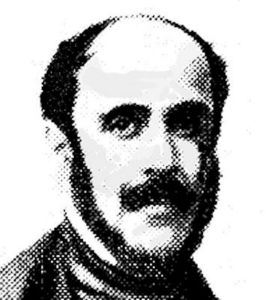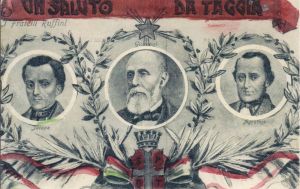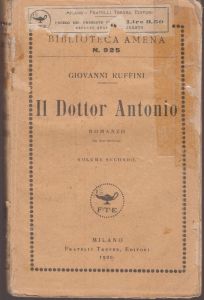Writer and Patriot
The life of the Ruffini family was very troubled due to the fragile health of its members and problems with the judiciary linked to their patriotic activity.
His father, Bernardo Ruffini, of liberal ideas, had problems as a young man, which prevented him from pursuing a career in the magistracy and in 1831 he was appointed prefect of Genoa.
His mother, Eleonora Curlo Ruffini, daughter of Marquis Ottavio Curlo di Taggia, gave birth to thirteen children, but only four boys and a girl, Angiolina, reached adulthood. Giovanni was born in Genoa in 1807 and spent his childhood at Villa Eleonora in Taggia, after which he attended the Royal College of the Santissima Annunziata in Genoa, after which he enrolled in the Faculty of Law, graduating in 1828 in Jurisprudence and began to practice law.
Giovanni was born in Genoa in 1807 and spent his childhood at Villa Eleonora in Taggia, after which he attended the Royal College of the Santissima Annunziata in Genoa, after which he enrolled in the Faculty of Law, graduating in 1828 in Jurisprudence and began to practice law.
It was during this period that his brother Jacopo introduced him to Giuseppe Mazzini. He joined the Carboneria and then the Giovine Italia and began his patriotic activities with his brothers.
On the night of 13th May 1833, his brother Jacopo was arrested in his home in Genoa by the Savoy police and, after being subjected to a series of gruelling interrogations in the prisons of Palazzo Ducale so as not to reveal the names of his fellow fighters, he committed suicide in the early hours of the morning of 19th June, by cutting his throat.
On 17 September 1833 Giovanni was condemned to death for conspiracy against the State and decided to leave for Marseilles, where he met Mazzini.
 He was joined by his younger brother Agostino, also a Mazzinian, and decided to move to Switzerland, first to Geneva and then to Grenchen, where he signed the act of brotherhood of the Giovine Europa promoted by Mazzini.
He was joined by his younger brother Agostino, also a Mazzinian, and decided to move to Switzerland, first to Geneva and then to Grenchen, where he signed the act of brotherhood of the Giovine Europa promoted by Mazzini.
In January 1837, again with his brother, he decided to move to Great Britain, to London, where he began to study English.
It was during this period that he began to work on his first novel "Lorenzo Benoni", but since the publishers to whom he presented it did not approve of it, he decided to put it aside.
In the meantime in England, having become friends with Thomas Carlyle, thanks to the latter, he frequented the English intellectuals of the time.
In 1841 he chose Paris as his new residence, where he matured his detachment from Mazzini's ideals and applied to King Carlo Alberto for a pardon for his death sentence.
In the same year, he briefly saw his mother again in Montpellier, who was particularly tried by numerous family bereavements, not least the death in 1839 of her eldest son Ottavio, who had never been interested in politics, and of her husband in 1840.
In the French capital, he collaborated with Gaetano Donizetti, writing for the latter, in 1842, the librettos for "Dom Sebastian, King of Portugal" and "Don Pasquale", signed with the initials of Michele Accursi.
At the end of May 1848, after the issuing of the Statuto Albertino, he returned home and was elected deputy to the Subalpine Parliament for the Taggia constituency.
In 1849 he was again elected to the Chamber and appointed by Vincenzo Gioberti as minister plenipotentiary of the Sardinian government to the French Republic in Paris. However, the appointment was short-lived as he resigned as soon as he heard that Gioberti had fallen from grace and returned the money he had paid for his duties.
Following the defeat at Novara (First Italian War of Independence), he abandoned political life and retired to Taggia to remain at the side of his brother Agostino (who died in January 1855).
In the same years he resumed his literary activity and managed to publish "Lorenzo Benoni, ovvero Pagine della vita di un Italiano" in 1853. In 1855 he published "Il Dottor Antonio", which was to be his greatest literary success. This typically nineteenth-century novel was important both in supporting the cause of the Italian Risorgimento and in introducing the Ligurian Riviera and especially Bordighera to the English public.
In 1855 he published "Il Dottor Antonio", which was to be his greatest literary success. This typically nineteenth-century novel was important both in supporting the cause of the Italian Risorgimento and in introducing the Ligurian Riviera and especially Bordighera to the English public.
All the British tourists who went to Bordighera asked to visit the "Locanda del Mattone", where the sweet Lucy Davenne had been treated by Doctor Antonio.
In 1856 he published "The Paragreens on a visit to the Paris universal exhibition", a humorous caricature of an English family's visit to the Paris Exhibition of 1855, and the novels "Lavinia" (1860) and "Vincenzo, or, Sunken Rocks" (1863).
In 1864, the London "Macmillan's Magazine" published an article on the tourist situation in Sanremo, entitled "Sanremo revisited", which was translated into Italian the following year, while in 1867, a recollection of his stay in Switzerland, entitled "A quiet nook in the Jura", was published in Edinburgh.
In 1837, he met Cornelia Turner, with whom he was to have a long relationship.
On 11 November 1856, his mother, Eleonora Curlo, died in Taggia and only Giovanni and Angiolina survived from the large family.
The death of Cornelia Turner in Paris on 25 October 1874 deprived him of one of the most important female figures in his life, to whom he had been most emotionally attached along with his mother.
In 1875 he decided to return to Italy, settling definitively in Taggia, where he died on 3rd November 1881, at the age of 74.
(source: text from Andrea Gandolfo's notes; Wikipedia)




